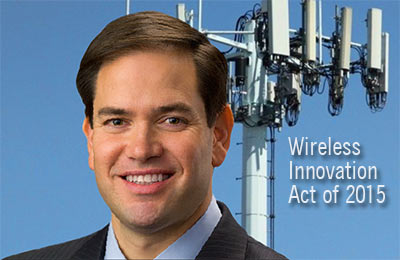U.S. Senator Marco Rubio (R-FL), a member of the Committee on Commerce, Science and Transportation and the Subcommittee on Communications, Technology, Innovation, and the Internet, joined with subcommittee chairman Roger  Wicker (R-MS) and fellow members Kelly Ayotte (R-NH), Cory Gardner (R-CO) and Ron Johnson (R-WI) to introduce the “Wireless Innovation Act of 2015” yesterday, a bill to reallocate spectrum used by the federal government for commercial wireless services, ensure greater transparency and accountability of the federal government’s spectrum use, and promote wireless innovation and deployment.
Wicker (R-MS) and fellow members Kelly Ayotte (R-NH), Cory Gardner (R-CO) and Ron Johnson (R-WI) to introduce the “Wireless Innovation Act of 2015” yesterday, a bill to reallocate spectrum used by the federal government for commercial wireless services, ensure greater transparency and accountability of the federal government’s spectrum use, and promote wireless innovation and deployment.
“As wireless broadband and Internet connected devices continue to grow, the U.S. must continue to lead the world in wireless innovation and technology by making sure the federal government is using its spectrum in an efficient and responsible manner and freeing up additional spectrum for commercial use,” Rubio said.
“Mobile traffic is expected to grow eleven-fold between 2013 and 2018, according to industry projections,” Johnson said.
“Industry is clearly doing its part to prepare, bidding an unprecedented $41 billion on the most recent FCC spectrum auction. This bill will require the federal government to do its part, opening up more spectrum opportunities, expediting FCC review of spectrum transactions on the secondary market, and streamlining the process for broadband infrastructure to locate on federal buildings. The real solution to broadband openness and availability is breaking down regulatory barriers, not building them up. This bill is an important first step and I look forward to working with Senators Rubio, Wicker, Ayotte, and Gardner to continue to find ways to promote broadband deployment,” Johnson said in a statement.
PCIA strongly endorses Rubio Bill
In commending Rubio for introducing legislation aimed at spurring economic growth and bringing next-generation mobile data to underserved areas, Jonathan Adelstein, President and CEO of PCIA – The Wireless Infrastructure Association, said “Senator Rubio has taken a crucial step toward ensuring that all Americans have equal and reliable access to the mobile data that’s transforming our economy and society.”
Adelstein noted that nearly a third of America’s landmass and thousands of buildings are owned or controlled by the Federal government, and the bill would improve wireless service for members of the armed services, as U.S. military bases fit within the definition of Federal lands and stand to benefit from the clarifications the bill provides.
“Senator Rubio is a former state legislator and city commissioner. He recognizes the urgency of building public-private partnerships to ensure that wireless infrastructure is placed where it will best benefit consumers and businesses,” Adelstein said.
In addition to helping the wireless infrastructure industry better serve its customers and meet the Federal mandate of ubiquitous wireless broadband coverage, the Rubio bill will also help Federal agencies by allowing work to scale with deployment demands, by supporting fee retention, and by providing an ombudsman to expedite stalled applications. These initiatives will provide agencies and the industry the certainty they need for new projects, noted Adelstein.
The Wi reless Innovation Act of 2015 would:
reless Innovation Act of 2015 would:
- Require NTIA to identify and reallocate 200 MHz of spectrum below 5 GHz and currently allocated primarily to the federal government for commercial mobile use (140 MHz for licensed use; 40 MHz for shared; 20 MHz for unlicensed use);
- Establish an auction pipeline to ensure the 200 MHz of spectrum identified by NTIA is reallocated in a clear, predictable manner;
- Allocate portions of the auction proceeds be made available to federal entities for conducting research and development and other engineering activities to:
- Identify alternative spectrum (either federal or non-federal) that existing systems can be relocated to,
- Develop technologies that will allow existing systems to be relocated and shared with other Federal systems, and
- Develop cost and time estimates for relocating existing systems;
- Require OMB to report to Congress details of how agencies are using these funds so Congress knows how agencies are utilizing the funds and what bands agencies are considering for potential use;
- Promote secondary spectrum markets by expediting the FCC review period for routine license transfers;
- Require OMB to review agency requests for new or modified frequency assignments for a wireless service by requiring agencies to submit an analysis addressing issues including whether commercial services could be used instead of new or modified frequencies, whether other Federal spectrum could be used or shared, and whether the service requires frequency below 3 GHz;
- Provide transparency on the use and value of federal spectrum by requiring NTIA to develop a framework to determine the commercial value of each federal spectrum band, and requiring federal agencies to report the opportunity cost borne for each spectrum band that is entirely under the control of that agency as part of its budget; and
- Promote the deployment of wireless infrastructure on federally owned buildings and property by streamlining the process by creating a standard fee and master application to grant real property interests.
















